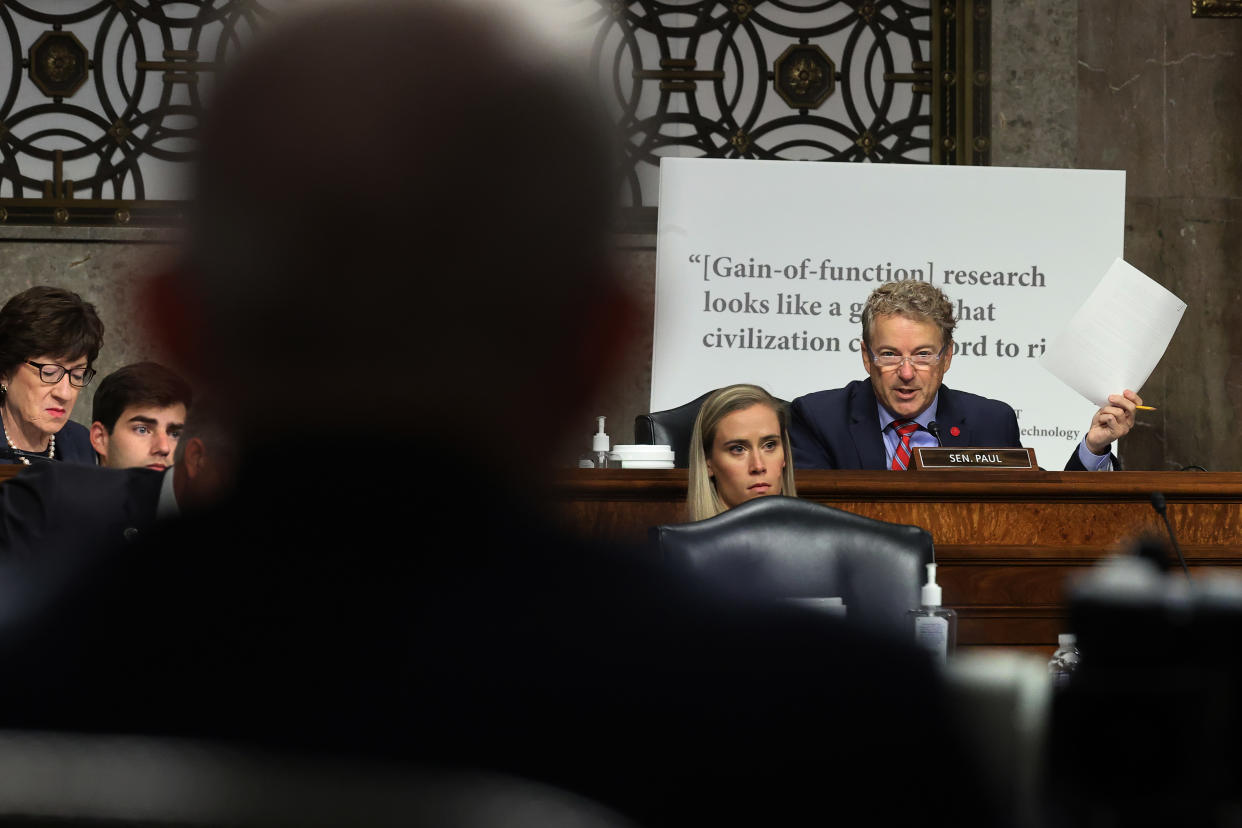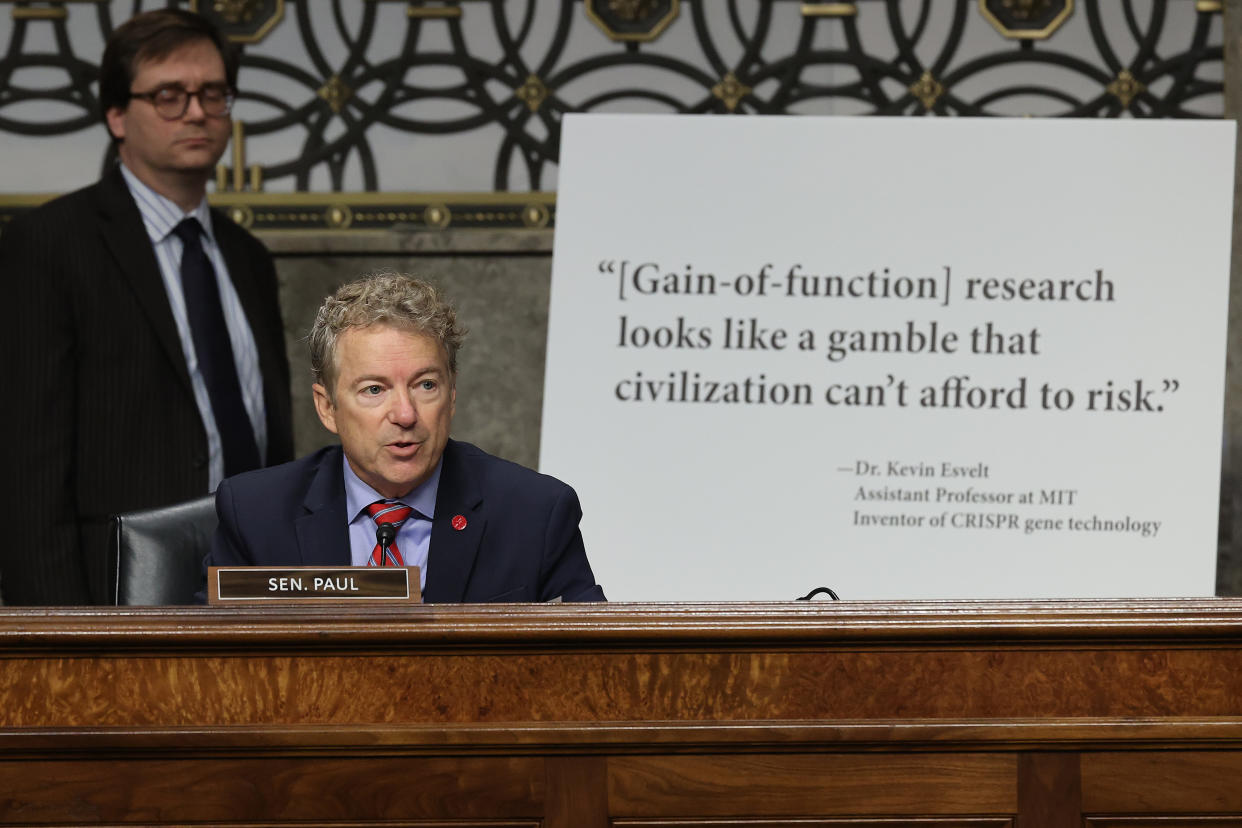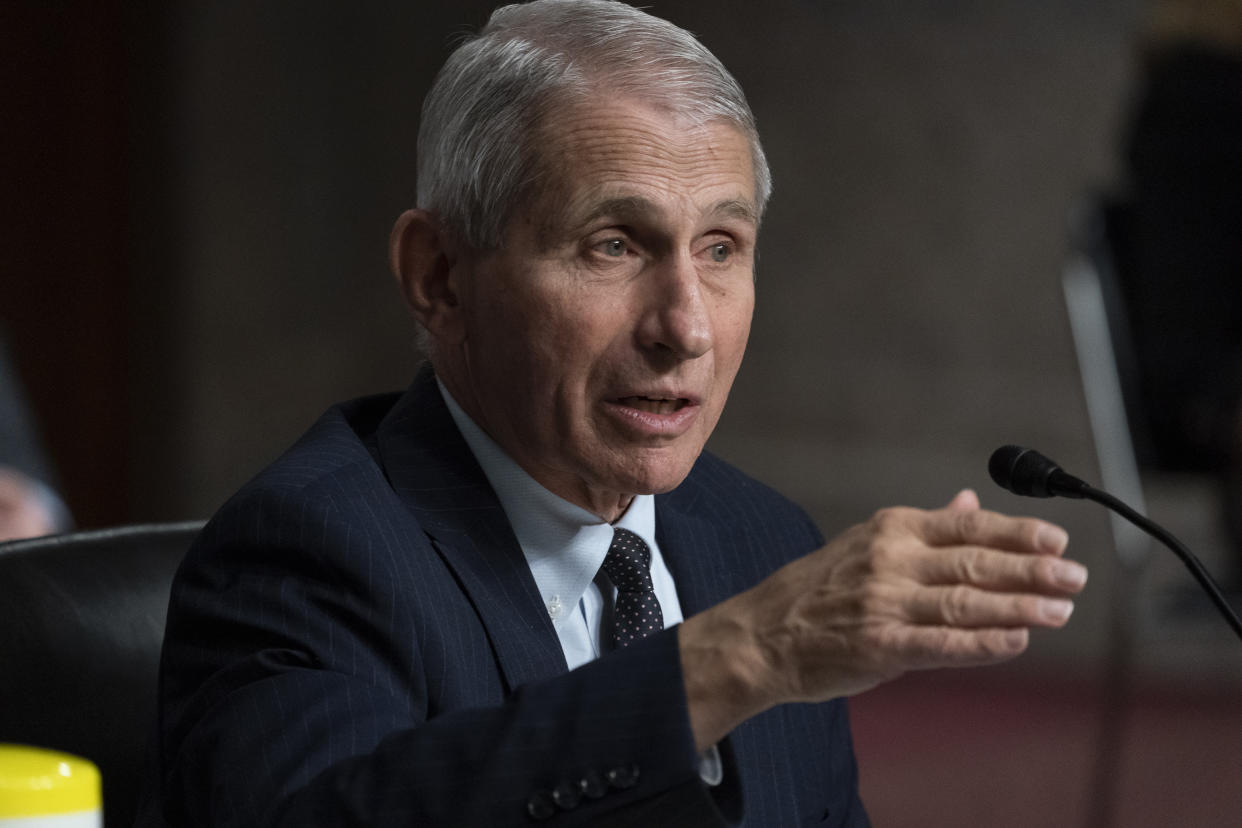'Egregiously incorrect': Fauci rebuts Paul in another tense exchange on pandemic origins
WASHINGTON — Sen. Rand Paul, R-Ky., and Dr. Anthony Fauci, the top medical adviser to President Biden, engaged in by-now-familiar recriminations at a Senate committee hearing on Thursday, clashing — as they have before — on the origins of the coronavirus. Simply put, Paul believes that Fauci is hiding the extent to which the United States was complicit in funding Chinese research he is convinced led to the creation of the pathogen known as SARS-CoV-2.
A veteran of seven presidential administrations, Fauci has his own ideas about Paul — an ophthalmologist by training — that he has not been shy about expressing. “He is egregiously incorrect in what he says,” Fauci said at the conclusion of their confrontation, to which he listened, as he usually does, with grim annoyance.
“History will figure that out on its own,” Paul shot back. A libertarian with unconventional views on the pandemic, the senator has challenged mask mandates and vaccinations, while focusing on the origins of the pandemic. While some say that focus has been justified by revelations about the shadowy world of high-stakes virus research, Paul has been accused of conspiratorial fearmongering.
So it went on Thursday, with Paul showing little interest in the purported topic of the hearing: “Next Steps: The Road Ahead for the COVID-19 Response.” Testifying alongside Fauci were Centers for Disease Control and Prevention Director Rochelle Walensky, acting Food and Drug Administration Commissioner Janet Woodcock and high-ranking federal preparedness and response official Dawn O’Connell.

They intended to talk about issues like rapid tests, booster shots and childhood vaccinations, even if they knew that Fauci — a favorite target of the right — would endure intense attacks from the likes of Paul.
Fauci has persistently denied that he oversaw any funding of gain-of-function research, a complex term whose definitions have changed. In a congressional hearing earlier this year, he justified partnering with Chinese researchers. But as the extent of those partnerships has continued to emerge, Fauci has had to defend himself and the scientific institutions he represents, not to mention a White House where he is a top adviser to the president.
Paul and other conservatives insist that Fauci, who heads the National Institute of Allergy and Infectious Diseases, which is part of the National Institutes of Health, funded research at the Wuhan Institute of Virology in the Chinese city of Wuhan that boosted the virus’s lethality and transmissibility. Such gain-of-function research has been used to understand how viruses behave. Some supporters of former President Donald Trump have gone as far as to accuse China of creating the coronavirus as a bioweapon — with Fauci’s help.
There is no evidence that any of that is true, and an unclassified version of a national intelligence assessment released last week largely discounted the idea that the virus was either engineered or adapted in a lab (though one intelligence agency did have “moderate confidence” the virus escaped from a Chinese lab).

Yet without evidence of how the coronavirus did enter the human population, conspiracy theories abound, as do legitimate concerns about biosecurity. Paul is known in Washington for harboring questionable beliefs, which he freely shares, as he did during Thursday’s hearing when he told Fauci it was incontrovertible that the NIH “created viruses not found in nature that actually did gain in lethality.”
At question are several grants from the NIH to EcoHealth Alliance, a New York not-for-profit that studies emerging diseases and whose chief executive, Peter Daszak, has been an ardent defender of China. EcoHealth Alliance used those funds from the U.S. government to support work at the Wuhan Institute of Virology. The question is whether that work constituted gain-of-function research as the term is somewhat narrowly defined by the federal government, or under the broader understanding within the scientific community.
In a letter to members of Congress sent last month, NIH Deputy Director Lawrence Tabak wrote that the strains of bat virus involved in these subgrants from EcoHealth “are not and could not have become SARS-CoV-2.”
Refutations like these have done little to deter Paul or his adherents. On Thursday morning he lectured Fauci — who began his career fighting HIV/AIDS and, much later, personally treated Ebola patients — about how gain-of-function research could “cause a pandemic even worse the next time,” alluding vaguely to research he claimed involved viruses 15 times more lethal than the coronavirus.

“Yes, our civilization could be at risk from one of these viruses,” Paul said. “And here you sit, unwilling to accept any responsibility for the current pandemic,” he added a little later, “and unwilling to take any steps to prevent gain-of-function from possibly unleashing an even more deadly virus.”
Fauci has done little to hide the fact that he disdains Paul as much as Paul disdains him. Speaking on Thursday, the veteran government immunologist conceded that gain-of-function is a “very nebulous term” but said that under no definition had the U.S. government launched such investigations in China.
Unsatisfied, Paul accused him of “defining away” the very idea of gain-of-function research and of trying to “cover your ass, basically.” He urged Fauci to resign, something the four-decade veteran of government service is unlikely to do as a result of political pressure.
In many ways, the acrimony between Fauci and Paul mirrors sharp political divisions over the pandemic. Paul has been pushing for the country to return to normal since long before most epidemiologists said it was safe to do so. Fauci, on the other hand, has been a proponent of safety measures like masking, which Paul opposes, and vaccinations, which Paul believes should not be mandated. Fauci would like to see the pandemic end; Paul has believed it to be over for months and is seemingly more interested in punishing China than preparing for the next outbreak.

When the world first learned of SARS-CoV-2, the leading theory was that the virus originated in a market in Wuhan where exotic animals were sold. Over the past year, however, the possibility that it could have escaped via a laboratory accident has gained more traction.
Trump strenuously endorsed the so-called lab leak hypothesis, but his anti-Chinese rhetoric had the paradoxical effect of making both researchers and journalists unwilling to engage on a topic that could be used to further a xenophobic narrative.
That changed with the Biden administration, which sees China as an adversary but has avoided unnecessarily divisive rhetoric when it comes to the East Asian superpower. Biden has himself endorsed looking at the lab leak hypothesis, asking his intelligence community to investigate the origins of the virus. American intelligence analysts have been unable to come to any definitive conclusion on its origins.
Absent cooperation from China, proponents of competing origin stories find themselves clashing over facts, assertions and insinuations, as Paul and Fauci did on Thursday. As their heated exchange came to an end, Paul counseled Fauci to take responsibility for the pandemic.
“I have no responsibility for the current pandemic,” Fauci retorted.
______


